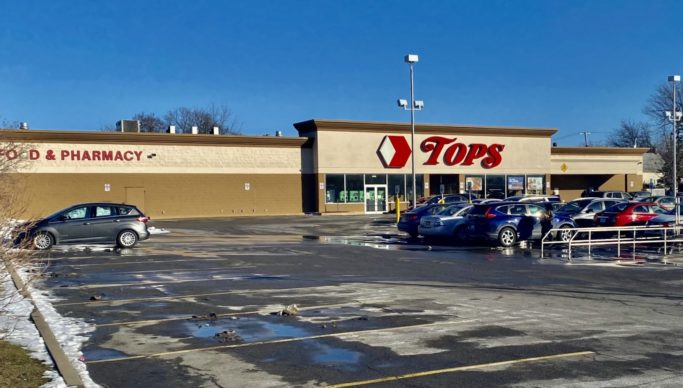
Communities Are Dialing 911—Shall We Answer or Let It Go to Voicemail? Buffalo and “The Great Replacement Theory” Revisited
- By Lew Morningstar --
- 17 Mar 2023 --
On May 14, 2022, Latisha, an assistant office manager at the Jefferson Avenue Tops Supermarket in Buffalo, New York, tried to make herself invisible. Lying behind the customer service counter she dialed 911 and whispered into her phone. The 911 dispatcher yelled at her to speak up. Latisha said, “I’m scared for my life. I don’t want him to hear me. Can you please send help?” The dispatcher, annoyed, hung up on her and the shooter continued his rampage that took ten lives and wounded three others.
A cry for help is not necessarily a cry. It may be a terrified whisper, like Latisha’s. It may come from an individual or it may come from a whole community that is under attack. Or from several communities.
The Black community, the Muslim community, the Jewish community, the LGBTQ and the AAPI communities are all threatened by domestic terrorism wreaked by white supremacists.
Five days after the massacre at Tops Supermarket the Anti-Defamation League (ADL) a leading anti-hate organization, held a public virtual briefing, featuring ADL CEO Jonathan Greenblatt, the Director of Content and Editorial Strategy for ADL’s Center on Extremism Jessica Reaves, and ADL’s Regional Director for NY/NJ Scott Richman.
The meeting, titled Fighting Hate from Home: The Clear and Present Danger of Conspiracy Theories, was moderated by ADL’s Vice President of Leadership Deb Leipzig.
Mr. Greenblatt put it succinctly: “The idea that the simple act of buying food for you or your loved ones would be taking a risk is stunning. This wasn’t just another mass shooting. The shooter had plotted for weeks in advance, and drove more than 200 miles to target the top supermarket with Black shoppers for an act of depravity and domestic terrorism. From his screed we learned that he murdered these Blacks in order to ignite a war between Jews and Gentiles—the Great Replacement Theory.”
What is the Great Replacement Theory? It’s a conspiracy theory that there is an invasion of non-whites occurring in this country and that “legacy Americans” must all be afraid and take action. It takes various forms: “millions of immigrants are stuffing the ballot boxes illegally,” “mixed marriages are diluting our racial purity,” “they’re coming in and taking our jobs.”
Jessica Reaves, who has been tracking domestic terror incidents and is an expert on the Great Replacement Theory, said, “It feels practiced and rehearsed. The shooter’s manifesto leaned heavily on the Great Replacement Theory and lifted passages from the Christchurch manifesto. In fact, 63% of what he wrote was copied directly. ‘The white culture is being replaced.’ It’s a toxic rejection of everything this country purports to stand for. ‘It’s already too late. Violence is the only solution.’ The Buffalo shooter targeted the so-called Zionist conspiracy and George Soros. And just like the Christchurch murderer, he traveled hundreds of miles to arrive at a specific place in a specific neighborhood at just the time when the most people would be there.”
Ms. Reaves noted that a good measure of our rage should be directed at social networks. The Buffalo shooter, according to her research, was influenced by the 4chan platform. Like the Christchurch shooter, he live-streamed his crime, and like the Christchurch and El Paso shooters, he published a manifesto. Ms. Reaves pointed out that these live streams and manifestos are not just the rantings of severely troubled individuals. Each one is a blueprint, a “how-to” that can be shared on social media for anyone who wants to do likewise.
ADL continues to pressure social media platforms to enforce their own guidelines, to make their spaces safer and less inundated with hate. “We don’t believe in censorship,” Mr. Greenblatt said. “Stopping slander, stopping incitement is not the same as stopping free speech.”
Mr. Scott added some perspective to the problem with social media. He said, “The Communication Decency Act of 1996 was a change from the way it was before. Companies used to be liable if hate speech was put on their platforms. But people didn’t want to restrict companies on the internet—they could not have anticipated Facebook and others. We still are feeling the effects of that 1996 Act which absolves online social media from anything posted on their platforms.”
Hand-in-hand with social networks is the media. Ms. Reaves pointed out that the media and its personalities have been spreading the replacement conspiracy theory. “So it’s no surprise that it’s echoed and promoted across media outlets on the airwaves, very accessible.”
Ms. Reaves added, “Another slice of our outrage must be directed at politicians and pundits who have spread The Great Replacement Theory. They’ve been either blaming [a political party] or calling it a false flag.”
But beyond our outrage is a more important factor to be drawn from the horrific event at the supermarket on Jefferson Avenue. Ms. Reaves said, “Above all else we have to learn from this terrible day. Because extremists will learn from it too.”
Communities are dialing 911. Will we hear them and send help, or must they cry out louder and louder before we hang up, to the detriment of us all?



















